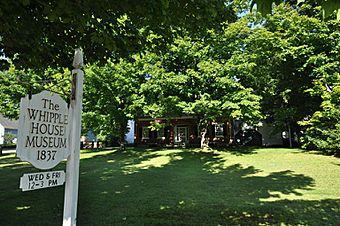Whipple House (Ashland, New Hampshire) facts for kids
Quick facts for kids |
|
|
Whipple House
|
|
 |
|
| Location | 4 Pleasant St., Ashland, New Hampshire |
|---|---|
| Area | 0.8 acres (0.32 ha) |
| Built | 1837 |
| NRHP reference No. | 78000338 |
| Added to NRHP | December 13, 1978 |
The Whipple House is a special old home in Ashland, New Hampshire. It is located at 4 Pleasant Street. This house was built around 1837 and looks like a classic "Cape-style" house. It is famous because George Hoyt Whipple, a doctor who won a Nobel Prize, was born here in 1878.
Dr. Whipple later gave the house to the town in 1970. Today, the Ashland Historical Society runs it as a museum. You can visit it during the warmer parts of the year! The house became a protected historic place in 1978.
Contents
About the Whipple House
The Whipple House is found on a quiet street in the village of Ashland. It is a brick building with one and a half stories. The roof has a pointed shape, called a gable roof. There are two chimneys on the ends of the house. A wooden addition, called an ell, is at the back.
The front of the house has five windows. They are placed evenly around the main door. There are also two small windows on the roof, called dormers. The front door is set back a bit. It has small windows on the sides and above it.
Inside the House
When you go inside, you find a main hallway in the middle. There are two rooms on each side of this hall. The attic also has rooms. The wooden part at the back of the house holds the kitchen downstairs. Bedrooms are located upstairs in this section.
History of the Whipple House
This house was built around 1837. It is a great example of a traditional Cape-style home. These homes were adapted for new heating methods like wood stoves. Before, people used open fireplaces.
George Hoyt Whipple's Legacy
George Hoyt Whipple was born in this house in 1878. The house stayed in his family for many years. Dr. Whipple later gave it to the town to be used as a museum.
Dr. Whipple was a very important doctor and scientist. He won the Nobel Prize for Medicine in 1934. He shared the prize with two other scientists. They won for their work on understanding and finding a cure for a serious blood problem called pernicious anemia. Dr. Whipple also did a lot of important research to help us understand how the human liver works.
More to Explore
- National Register of Historic Places listings in Grafton County, New Hampshire
- New Hampshire Historical Marker No. 100: George Hoyt Whipple



